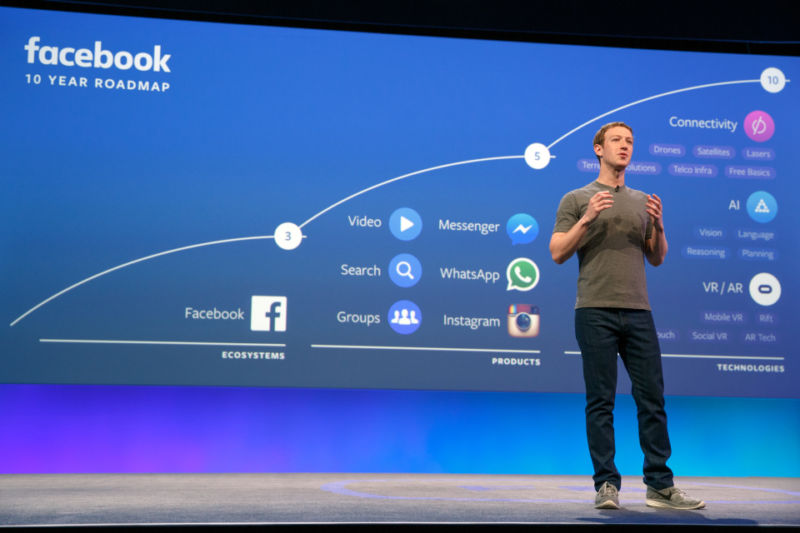
Mark Zuckerberg is giving up on an audacious plan to sell most of his Facebook shares without diminishing his total control over the company. The plan, which Facebook announced last year, would have given shareholders two new non-voting shares for each voting share they owned. Zuckerberg hoped to sell these shares to finance his charitable ambitions.
But shareholders sued, arguing that the plan would further consolidate power in Zuckerberg's hands with no benefits to other shareholders. Zuckerberg was scheduled to testify in court in the case on Tuesday. Abandoning the plan saves Zuckerberg from having to do that.
Most companies operate according to a one-share-one-vote principle. But several high-profile technology companies, including Google, Facebook, and Snap, give extra per-share voting rights to founders and early investors. These extra votes give Larry Page and Sergey Brin a majority of Google's voting power even though they own much less than half of Google's shares. The same is true at Snap, where co-founders Evan Spiegel and Bobby Murphy together exercise a majority of the company's votes, giving them total control over the company's management.
Facebook's corporate structure is even more concentrated: Zuckerberg alone controlled a majority of Facebook's shares when the company went public in 2012.
You might wonder why anyone would buy shares in a company where they had no influence in how it was run. Partly, investors were betting on the business savvy of the companies' legendary founders. But they also knew that Page, Brin, and Zuckerberg had a strong incentive to do a good job since most of their fortunes would be tied up in the companies they ran. If they tried to sell too many of their shares, their voting power would fall below 50 percent and other shareholders would gain the ability to fire them. Whatever else you might say about the arrangement, investors at least went into the deal with their eyes open.
But then Google decided to change the rules in a way that made things even more favorable to the co-founders. In 2012, Google proposed creating a new class of non-voting shares and distributing one for each share outstanding. That would have allowed the Google founders to sell half their shares without diluting their control of the company, and it also would have allowed them to issue new non-voting shares to use for acquisitions—again, allowing the company to grow without affecting Page and Brin's control.
Normally, a change like this has to be approved by shareholders. But Brin and Page controlled a majority of Google's voting shares, virtually guaranteeing that Google's board would approve the arrangement.
So shareholders sued, arguing that the stock split benefited Page and Brin at the expense of other shareholders. With a smaller stake in Google, shareholders said, the co-founders would have a reduced incentive to manage Google well. But Google settled the lawsuit in 2014, allowing the stock split to go forward, and the courts never ruled on the legality of the proposal.
Zuck’s turn
Zuckerberg hoped to follow Google's playbook with an even more ambitious three-for-one stock split. If successful, it would have allowed Zuckerberg to sell more than two-thirds of his shares without losing control of Facebook. That would have helped him fulfill his pledge to give away 99 percent of his wealth to charity.
But the plan hasn't gone smoothly. As with Google's plan, Facebook shareholders sued. Information uncovered during litigation revealed that one of Facebook's board members, venture capitalist Marc Andreessen, was coaching Mark Zuckerberg via text message on how to win over other board members at the same time he was supposed to be representing the interests of all shareholders.
If the lawsuit had continued, Zuck could have faced awkward questions about this potential conflict of interest. Instead, Facebook is giving up the fight. "This is an unconditional surrender," shareholder attorney Stuart Grant told BuzzFeed. "I do think the message is loud and clear: you can’t just run over the stockholders."
Zuckerberg explained the decision to drop the proposal in a Friday post on Facebook, writing that last year he thought the stock split was "the best way to do both of these things. In fact, I thought it was the only way. But I also knew it was going to be complicated and it wasn't a perfect solution."
"Today I think we have a better one," Zuckerberg wrote. "Over the past year and a half, Facebook's business has performed well and the value of our stock has grown to the point that I can fully fund our philanthropy and retain voting control of Facebook for 20 years or more."
Still, dropping the stock split limits how many shares he can sell if he wants to maintain his lock on the CEO job. If he ever gives away the bulk of his shares, he'll lose his majority of Facebook's voting power, creating the possibility that other shareholders could fire him if Facebook starts to under-perform expectations.
reader comments
71